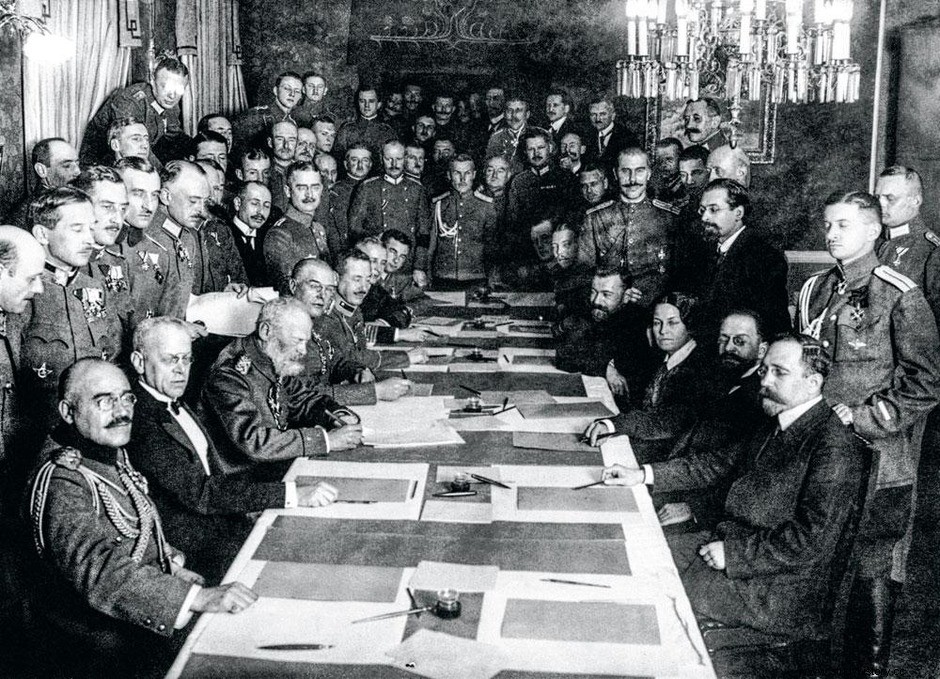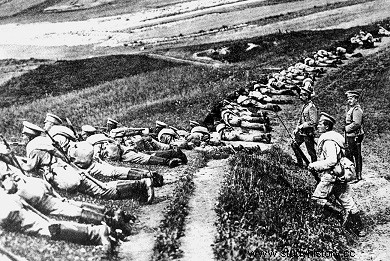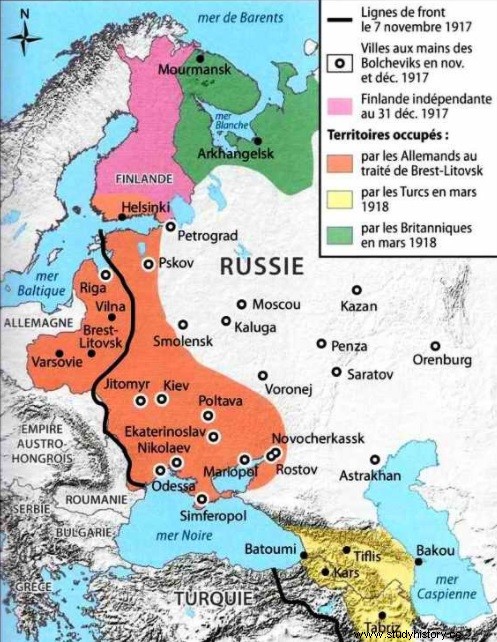 The Treaty of Brest-Litovsk was a separate World War I peace signed on 3 March 1918 between the government of Russia and the Central Powers (Germany, Austria-Hungary and Turkey) at Brest-Litovsk (now Brest, Belarus). In the midst of the civil war provoked by the Russian Revolution, Lenin had to accept the "shameful peace treaty" which took away from Russia not only 800,000 km2 of territory, but also a significant part of its agricultural and industrial resources concentrated in Finland, Poland , in the Baltic countries, in Ukraine, in part of Belarus; moreover, Russia had to deliver the cities of Ardahan, Batumi and Kars to Turkey and also pay war indemnities.
The Treaty of Brest-Litovsk was a separate World War I peace signed on 3 March 1918 between the government of Russia and the Central Powers (Germany, Austria-Hungary and Turkey) at Brest-Litovsk (now Brest, Belarus). In the midst of the civil war provoked by the Russian Revolution, Lenin had to accept the "shameful peace treaty" which took away from Russia not only 800,000 km2 of territory, but also a significant part of its agricultural and industrial resources concentrated in Finland, Poland , in the Baltic countries, in Ukraine, in part of Belarus; moreover, Russia had to deliver the cities of Ardahan, Batumi and Kars to Turkey and also pay war indemnities.
Russia in the First World War
Engaged from the start of the First World War alongside the allies, the Russian army suffered serious setbacks, particularly in East Prussia where it was completely crushed at Tannenberg (August 1914 ). The situation worsened in 1915 and the war, supposed to be brief, began to have its effects in the empire. On the German-Russian front, supply difficulties and poor logistics, combined with the negligence of military leaders, encouraged mass desertions.
 In 1916, the Russians led an offensive in the Baltic countries, but this attack, which aimed to relieve the Allies in Verdun, is a total failure. Not only did it not allow the Germans to be diverted from the Verdun front, but the Russians also lost more than 100,000 men there. From June to August 1916, General Brusilov launched another, happier offensive in Bukovina and Galicia, but the very heavy losses suffered (nearly a million soldiers) largely contributed to the discouragement of the army. The war becomes frankly unpopular and violent demonstrations, linked to the lack of coal and bread, break out in Moscow.
In 1916, the Russians led an offensive in the Baltic countries, but this attack, which aimed to relieve the Allies in Verdun, is a total failure. Not only did it not allow the Germans to be diverted from the Verdun front, but the Russians also lost more than 100,000 men there. From June to August 1916, General Brusilov launched another, happier offensive in Bukovina and Galicia, but the very heavy losses suffered (nearly a million soldiers) largely contributed to the discouragement of the army. The war becomes frankly unpopular and violent demonstrations, linked to the lack of coal and bread, break out in Moscow.
The revolt of the Russian people against the imperial government upsets the data in the year 1917. In March, a provisional government was put in place, and Tsar Nicholas II was forced to abdicate. The new power continued the war and, in July, General Brusilov launched an attack in Galicia and Bukovina. But the conquered territories are quickly taken back by the Austro-German forces. On September 3, the Germans seized Riga, defended by General Kornilov; in October, they invade most of Latvia, as well as a large number of Russian islands in the Baltic Sea. On November 7 (according to the Gregorian calendar), the Bolshevik party, one of whose main demands is the end of the war, takes power. Convinced of the need for immediate peace to give a future to the October Revolution, its leader Lenin is determined to engage in peace negotiations with Germany.
The Treaty of Brest-Litvosk and its consequences
 On December 15, 1917, an armistice was concluded in Brest-Litovsk between Soviet Russia and the Central Powers and Since then, talks have continued with a view to signing the peace treaty. Despite the opposition of Trotsky and several members of the central committee, who favored a "revolutionary war", Lenin maintained the need for immediate peace and the outbreak of a new German offensive (February 18, 1918) precipitated the final decision. .
On December 15, 1917, an armistice was concluded in Brest-Litovsk between Soviet Russia and the Central Powers and Since then, talks have continued with a view to signing the peace treaty. Despite the opposition of Trotsky and several members of the central committee, who favored a "revolutionary war", Lenin maintained the need for immediate peace and the outbreak of a new German offensive (February 18, 1918) precipitated the final decision. .
The Treaty of Brest-Litovsk (March 3, 1918) was disastrous for Russia, which lost all of Poland, Lithuania, the Baltic countries, part of Belarus, ceded Batum, Kars and Ardahan to Turkey, recognized the independence of Finland and Ukraine, thus saw itself deprived of 90% of its coal production, 70% of its metallurgy, 55% of its agricultural wealth. The work carried out for three centuries by the tsars seemed destroyed and the Russia of the soviets was now, in Europe, smaller than Muscovy at the accession of Ivan the Terrible
This peace on the eastern front, which allowed forty Austro-German divisions to be diverted from the eastern front and directed towards the West, was naturally regarded as a betrayal by the Allies, who would now support all counter-revolutionary forces. The October Revolution had also caused a stupor in the West, where it was unanimously denounced. True to his radicalism, Lenin seemed to turn his back on the rest of the world.
The transfer of the capital to Moscow (March 12, 1918) seemed, in the eyes of the West, the symbol of a regression of Russia to primitive barbarism, after the Age of Enlightenment opened by Peter the Great. On November 13, 1918, after the defeat of the Central Powers, the Treaty of Brest-Litovsk was canceled by the Soviet government, which then endeavored to reconquer the lost territories. The Treaty of Versailles, which ended World War I, also declared the Treaty of Brest-Litovsk void. .
To go further
- Atlas of the First World War. Editions Ouest-France, 2014.
- History of the Russian Civil War:1917 - 1922, by Jean-Jacques Marie. Text, 2015.
